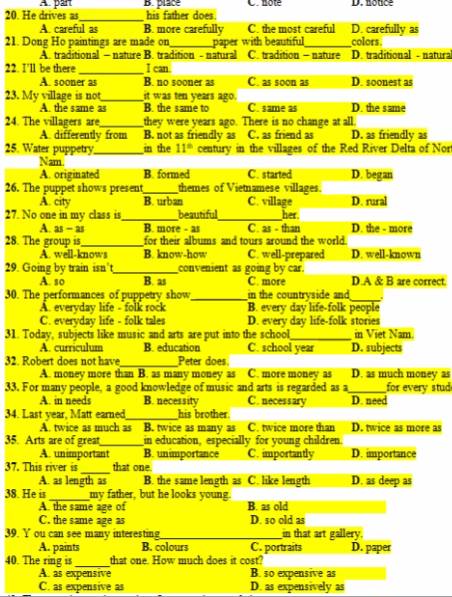Học tại trường
Chưa có thông tin
Đến từ
Chưa có thông tin , Chưa có thông tin
Số lượng câu hỏi
98
Số lượng câu trả lời
18
Điểm GP
0
Điểm SP
0
Người theo dõi (1)

Đang theo dõi (0)

Read and choose the correct word to complete the dialogue.
Nga: | (1) _______ does your father work, Mai? |
Mai: | He works in a factory (2) _______ Binh Duong |
Nga: | How (3) _______ is it from your house? |
Mai: | It’s (4) _______ 15 kilometers |
Nga: | Oh, it’s very far. How (5) _______ he go to work? |
Mai: | He goes (6) _______ motorbike. |
Nga: | How much time does it take (7) _______ to get there? |
Mai: | About one hour. Is your father’s company far (8) _______ your house? |
Nga: | Not very far. It takes him (9) _______ ten minutes to get there by car. |
Mai: | Oh, it’s very (10) _______ your house. Your father is so happy! |
1. A. When B. Where C. Who D. What
2. A. in B. at C. on D. between
3. A. much B. often C. long D. far
4. A. about B. to C. near D. above
5. A. did B. do C. does D. doing
6. A. across B. by C. in D. doing
7. A. her B. you C. me D. him
8. A. to B. for C. only D. any
9. A little B. few C. only D. any
10. A. near B. next C. far D. long

Complete the passage with the correct option.
A. jam | B. public | C. accidents | D. big | E. can | F. banned | G. slower |
Traffic congestion is when vehicles travel (1) _______________ because there is too much traffic on roads. This makes trip times longer and increases queueing. This is also known as a traffic (2) _______________. Congestion may result from a decrease in capacity, for example (3) _______________ on the road or roads being closed. Bad road layouts can also restrict capacity. Increased traffic, for example, by many cars leaving a sports stadium at the same time, (4) _______________ also cause congestion.
Where congestion is common, for example because of commuting in (5) _______________ cities, several methods are used to relieve it. Cars may be (6) _______________ in certain districts or certain times, or made to carry passengers or pay a fee, or people may use (7) _______________ transport, such as rapid transit, which travel independently of car traffic and are not affected by traffic jams.

. Complete the conversation, using the sentences (a - e) to fill in the blanks (1 - 5).
a. Really? And how about the bus driver? Does he drive carefully?
b. Hmm, I'm not in favour of travelling by bus. Most buses are old and hot.
c. How do you go to school, Mai?
d. Well, you're lucky then. Not all buses are as good as the Number 32 bus.
e. Oh, buses are rather slow, so you must take the early trip, right?
Kim: | (1) ________ |
Mai: | I catch the Number 32 bus. It's only 200 metres from my house to the bus station, so it's really convenient. |
Kim: | (2) ________ |
Mai: | Yeah, they could be extremely slow during rush hour, so I try to get on the bus before the traffic becomes heavy. |
Kim: | (3) ________ |
Mai: | Well, I don't know, but the Number 32 bus is clean. It has air conditioning, so it's quite cool on hot days. |
Kim: | (4) ________ |
Mai: | Yes, he does. He watches the road signs carefully and obeys the traffic rules. I've never seen him crossing red lights. |
Kim: | (5) ________ |






